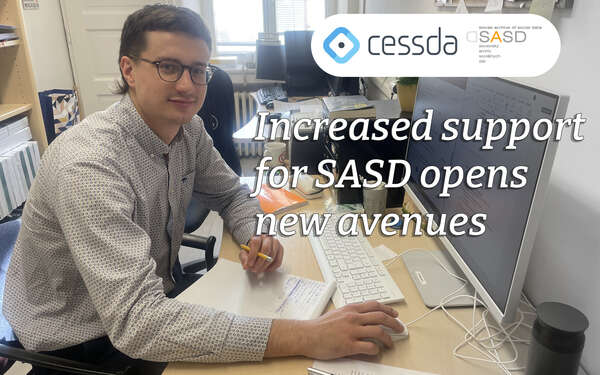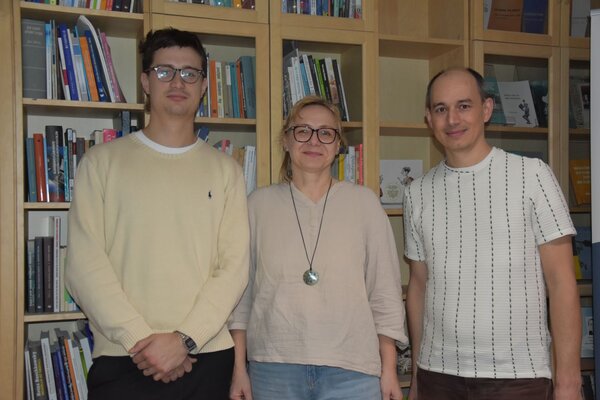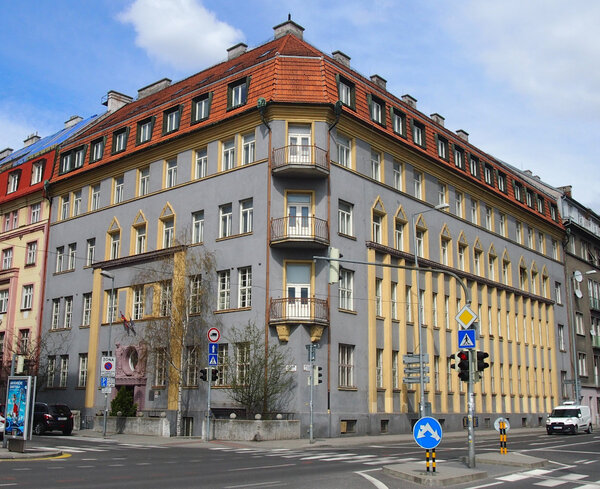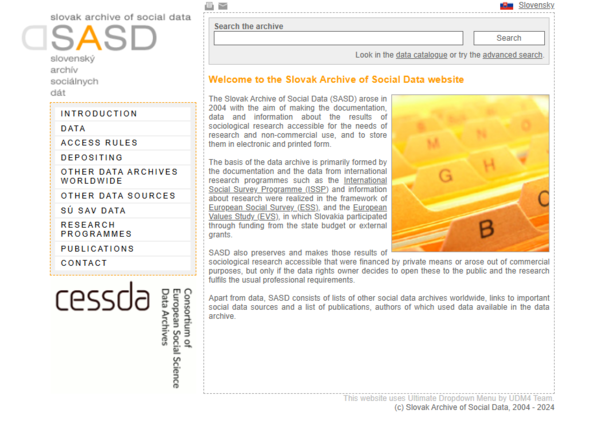
Increased support for SASD opens new avenues
Recently, CESSDA’s Slovakian Service Proovider, the Slovak Archive of Social Data (SASD), has experienced a notable strengthening of its institutional foundations and collaborative reach. Since 2025, the Slovak Ministry of Education has increased its support for SASD, recognizing the archive’s role in advancing open science and data accessibility. This enhanced support enabled the creation of a new position within the archive in 2025 and is expected to facilitate the establishment of additional roles in 2026, further reinforcing our operational capacity.
New member to the team
A new addition to the SASD team will help improve the overall level of archive services. With a background in sociology, Michal is familiar with social data, handling datasets, and knows how to navigate questionnaires, which is essential for his role in the archive. Michal will contribute in data stewardship and will help with SASD’s mission to ensure high-quality, accessible social data services. Among other responsibilities, he will serve as SASD’s new communication officer, and will play a key role as SASD works towards attaining the CoreTrustSeal certification—an essential step in demonstrating the trustworthiness of the repository.
“I want to help strengthen the visibility and usability of our data, and contribute to building a repository that researchers can trust,” said the Michal about his new role at SASD.

Michal on the left, along with his new colleagues Katarína Strapcová and director Miloslav Bahna.
Institutional and collaborative developments
SASD continues to contribute actively to national open science policy through its membership in the Working Group on Open Science at the Ministry of Education, Research, Development and Youth of the Slovak Republic. This engagement allows the repository to participate in shaping strategic directions for research data management and open access initiatives.
Their collaboration with CVTI SR—the Slovak Centre of Scientific and Technical Information—remains a cornerstone of the involvement in European Open Science Cloud (EOSC) activities. As the national coordinator of EOSC in Slovakia, CVTI SR provides essential infrastructure and strategic alignment, enabling SASD to participate in broader European efforts.
Education and training SASD
Most of the training and education events are organized as part of BA/MA/PhD. tertiary education across Slovakia. Employees at SASD also give presentations on how to use SASD data services, while there have also been some events and/or specialized workshops for broader scientific community where SASD services and data sources are presented.
Researchers at the Institute for Sociology SAS have close contacts with journalists and cooperate together on regular basis, often using data from SASD data catalogue to reflect current social issues.

Klemensova 19 in Bratislava is the home of the Institute for Sociology of SAS, and SASD's offices.
Impact of SASD work
The Institute's staff pays close attention to disseminating research findings and introducing the public to theoretically informed and data-driven interpretations of current social issues. In 2024, the Institute staff prepared 12 press releases and one press conference on the results of the research tasks, which received a great deal of media coverage. Press releases issued by the Institute and mediated by the media department of the Slovak Academy of Sciences were further distributed by several opinion-forming media. We attribute the continued high level of interest in the archive's datasets, which grew during the COVID-19 pandemic, to the continuation of the successful "How are you, Slovakia?" research series, as well as to the further expansion of the archive's holdings.
Latest datasets in the SASD repository
In parallel with these institutional and collaborative developments, SASD continues to expand its data repository. New datasets are now accessible via the SASD catalogue, enriching the repository’s coverage of current social dynamics in Slovakia. These include:
ISSP and CSES Slovakia 2024 [SASD 2024004]: This dataset contributes to international comparative research by capturing Slovak responses within the frameworks of the International Social Survey Programme (ISSP) and the Comparative Study of Electoral Systems (CSES), offering valuable insights into political attitudes and civic engagement. The core of the study is a detailed analysis of the 2023 parliamentary elections, including voter turnout, the choice of a specific party, satisfaction with the choice, and the assessment of the fairness and equitable nature of the elections. The questionnaire maps the sympathies and ideological alignment of the main political parties and their leaders, trust in key institutions, and the role of women in politics.
How are you, Slovakia?, March 2024 [SASD 2024002]: Part of a longitudinal series monitoring public sentiment, this wave focuses on respondents' political preferences, interest in politics, trust in institutions and concerns. The survey monitors respondents' attitudes towards the war in Ukraine and the reception of refugees from Ukraine, as well as geopolitical orientations and attitudes towards NATO. The questions cover the topic of electoral decisions in the 2024 presidential elections an the relative importance of individual topics in the decision making. The survey includes a series of questions on the criminal code reform, current political views and the environment. The data collection took place over a week before the first round of the presidential elections in 2024.
The project “How Are You, Slovakia?” has been monitoring public opinion in Slovakia since the very beginning of the COVID-19 pandemic. This project is an example of good practice in cooperation between the academic, non-academic, and commercial sectors. All surveys were carried out using the online panel of the research company and are representative of the adult internet population of Slovakia. The collected data were continuously made available in the Slovak Archive of Social Data. From the very start of the pandemic, the findings made headlines, appeared in TV news reports and editorials, and were featured in constant news coverage. Researchers from SAS were frequent guests on radio and television programs and podcasts. In the project’s first year alone, more than 450 outputs were produced, including over 30 interviews in podcasts, programs, and TV reports. Every press release from the project was also published on the SAS website.
Social survey of Ukrainian Migrants in Slovakia 2024 [SASD 2024001]: The survey is focusing on Ukrainian refugees (displaced persons), aged 18 and over, who arrived in Slovakia after February 2022. The survey focuses on their overall life situation in the Slovak Republic. A key part of the survey addresses employment and the labour market, with detailed questions covering economic status, specific job content, working conditions, and income in the SR. The survey also includes housing and financial situation, determining the type of accommodation (e.g., collective, rented, host family), the method of payment, and the overall financial affordability of basic necessities. Special attention is given to children's education, mapping their enrollment in pre-school, primary, and secondary schools in Slovakia and the reasons for any non-attendance. Under the theme of integration, the survey explores Slovak language proficiency, barriers to learning, the extent of contact with Slovaks, feelings of acceptance/exclusion, and overall satisfaction with life in the SR. The questionnaire also touches upon doctor registration, experiences with mental health issues, and future plans for returning to Ukraine or moving to another country. These additions reflect SASD’s ongoing commitment to timely, relevant, and ethically curated data that supports both national and international research efforts.

You can find these and more at the Slovak Archive of Social Data